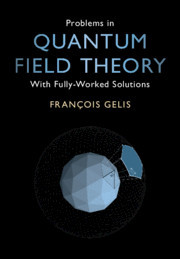Description
Problems in Quantum Field Theory
With Fully-Worked Solutions
Author: Gelis François
Language: English
Subject for Problems in Quantum Field Theory:
Problems in Quantum Field Theory
Publication date: 08-2021
375 p. · 18.5x26 cm · Hardback
Publication date: 08-2021
375 p. · 18.5x26 cm · Hardback
Approximative price 52.22 €
In Print (Delivery period: 14 days).
Add to cart
Problems in Quantum Field Theory
Publication date: 08-2021
375 p. · 17.7x25.2 cm · Paperback
Publication date: 08-2021
375 p. · 17.7x25.2 cm · Paperback
Description
/li>Contents
/li>Biography
/li>
This collection of problems in Quantum Field Theory, accompanied by their complete solutions, aims to bridge the gap between learning the foundational principles and applying them practically. The carefully chosen problems cover a wide range of topics, starting from the foundations of Quantum Field Theory and the traditional methods in perturbation theory, such as LSZ reduction formulas, Feynman diagrams and renormalization. Separate chapters are devoted to functional methods (bosonic and fermionic path integrals; worldline formalism), to non-Abelian gauge theories (Yang-Mills theory, Quantum Chromodynamics), to the novel techniques for calculating scattering amplitudes and to quantum field theory at finite temperature (including its formulation on the lattice, and extensions to systems out of equilibrium). The problems range from those dealing with QFT formalism itself to problems addressing specific questions of phenomenological relevance, and they span a broad range in difficulty, for graduate students taking their first or second course in QFT.
Preface; Acknowledgements; Notations and Conventions; Part I. Quantum Field Theory Basics; Part II. Functional Methods; Part III. Non-Abelian Fields; Part IV. Scattering Amplitudes; Part V. Lattice, Finite T, Strong Fields; Index.
François Gelis is a researcher at the Institut de Physique Théorique of CEA-Saclay, France. He received his M.S. from École Normale Supérieure de Lyon and a Ph.D. from the Université de Savoie. His research area is the theoretical study of the extreme phases of matter produced in heavy ion collisions. This led him to develop new Quantum Field Theory techniques to handle the strong fields encountered in these situations, for which he was awarded the Paul Langevin prize of the French physical society in 2015. He has taught QFT at École Polytechnique since 2016.
© 2024 LAVOISIER S.A.S.




